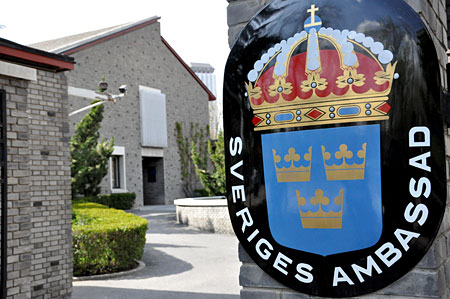In response to the European Council’s and the European Commission’s call for travel restrictions, the Government decided on the 18 of March to temporarily stop non-essential travel to Sweden to mitigate the effects of the COVID-19 outbreak and reduce the spread of virus. The decision takes effect on 19 March and will initially apply for 30 days. This is an exceptional measure that will not apply for longer than necessary.

Not all travel to Sweden will be stopped. Swedish citizens and other people who are resident in Sweden will be able to return to their homes. Nor will the entry ban apply to people who have particularly important grounds for travelling to Sweden. This includes diplomats, people in need of international protection and people who are to carry out essential functions in Sweden, such as health care professionals and people transporting goods to Sweden.
The entry ban applies to all foreign citizens attempting to enter Sweden from a country outside the EEA or from Switzerland and UK.
For more information about the entry ban, members of the public can telephone the Swedish Police on 11414 (from outside Sweden +46 77 114 14 00) and ask to be connected to the National Communications Department.
CURRENT EPIDEMIOLOGICAL SITUATION IN SWEDEN
COVID-19 cases in Sweden, 17 March 2020 (14.00): A total of 1 167 individuals have been confirmed to be infected with COVID-19 in Sweden (12 cases per 100 000 inhabitants), 57 per cent of those infected are men. These individuals are between the ages of 0 and 96 (the median age is 47). The majority of them were infected abroad (table 2). Most of those infected in Sweden were infected by people around them who had come home from travel abroad and turned out to be infected. The number of confirmed and suspected cases is changing constantly as people seek care and are examined to see if they are infected with the virus. There is some delay in the reporting of new cases.
TO TEST OR NOT TO TEST?
Sweden has increased testing for COVID-19 from almost 4 000 tests per week to 7 000 last week. Sweden carries out tests in cases where it is considered that a given test result can make a difference, i.e. if there is a specific measure to be taken depending on the result. Each country must take a decision on testing based on its own situation.
THE SCHOOLS IN SWEDEN – WHAT APPLIES?
On Tuesday, 17 March, the Public Health Agency of Sweden announced that it recommends that upper secondary school instruction should not take place in school premises, but should rather be conducted via online or distance learning. Corresponding recommendations also apply to vocational higher education, adult education and higher education institutions. This means that students should undertake distance learning at home and not be in school.
Compulsory school and preschools are not covered by the recommendation at the present time, since the consequences of closing these would be huge. One reason for not closing compulsory schools is that doing so may force parents of young children to stay at home from work. Should it become necessary to close compulsory schools, care must be ensured for the children of people who, for example, carry out vital public functions, such as healthcare workers, so that these parents do not have to stay at home. The Government is fast-tracking temporary legislation to handle a situation in which compulsory schools also close. The legislation now being prepared will provide a possibility for municipalities to offer childcare, preschool and after-school care to certain professional groups. This possibility is not available under current legislation.
RELEVANT MEASURES TAKEN BY SWEDISH AUTHORITIES
UPDATED NOTICE BLOCKS ON SWEDEN ABROAD
UD KOM has added notice blocks about COVID-19 to certain pages for all missions abroad on Sweden Abroad. This is to ensure that content and layout remain consistent across all pages.
Each mission abroad is still responsible for maintaining its own pages, including local travel information and push notifications.
MFA 24-HOUR PRESS SERVICE
There is currenly increased media pressure due to the COVID-19 situation. UD KOM would therefore like to remind you that we may be contacted 24 hours a day on ud.pressjour@gov.se if you need to discuss any media questions you have received. Since several of you are working under great pressure, you may also refer the media to our 24-hour press service.